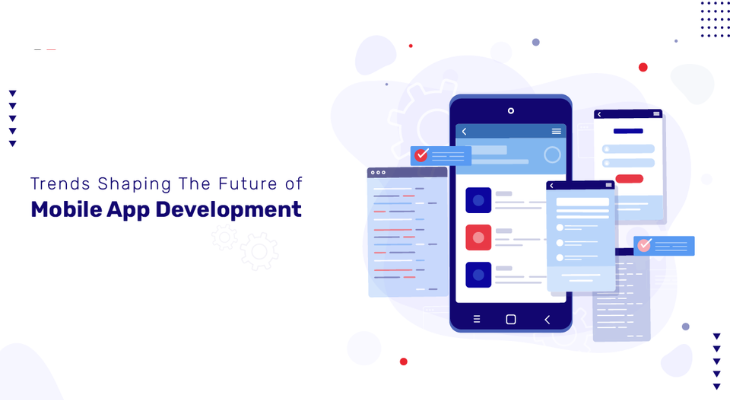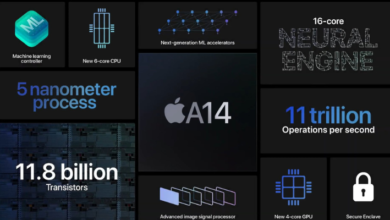The Future of Android App Development: Trends that will Shape the Industry

In the dynamic realm of mobile app development, the Android platform has emerged as a dominant force, powering billions of devices worldwide. With its open-source nature and vast developer community, Android has fostered an ecosystem of innovation and creativity, giving rise to a plethora of groundbreaking applications that have transformed our lives. As we venture into the future, Android app development is poised to undergo a remarkable transformation, driven by the convergence of cutting-edge technologies and the ever-evolving demands of users.
Table of Contents
ToggleKey Trends Shaping the Future of Android App Development

The future of Android app development is brimming with exciting possibilities, propelled by a wave of emerging technologies that are set to revolutionize the app landscape. Let’s delve into some of the key trends that will shape the industry in the years to come:
- AI and Machine Learning (ML):Artificial intelligence and machine learning are poised to play a pivotal role in shaping the future of Android app development. These technologies will enable apps to become more intelligent, personalized, and predictive, tailoring experiences to individual users’ needs and preferences. AI-powered chatbots and virtual assistants will become commonplace, while ML algorithms will power features like image and voice recognition, predictive analytics, and self-optimizing performance.
- Virtual reality (VR) and augmented reality (AR):Augmented reality and virtual reality are set to transform the way we interact with the digital world, and Android apps will be at the forefront of this revolution. AR will seamlessly blend virtual elements into the real world, enhancing navigation, education, and gaming experiences. VR, on the other hand, will create immersive, fully virtual worlds, opening up new frontiers in entertainment, training, and even healthcare.
- Internet of Things (IoT):The Internet of Things (IoT) is rapidly expanding, connecting a vast network of smart devices and creating a seamless interconnected world. Android apps will play a crucial role in managing and interacting with these IoT devices, enabling smart home control, wearable technology integration, and industrial automation.
- 5G:The advent of 5G, with its ultra-high-speed data transfer and ultra-low latency, will unlock a new era of Android app possibilities. Real-time streaming, cloud-based gaming, and demanding IoT applications will become a reality, pushing the boundaries of what’s possible on mobile devices.
- Wearables:Wearables, such as smartwatches and fitness trackers, are gaining increasing traction, and Android apps will be essential in harnessing their potential. These apps will provide real-time health monitoring, personalized fitness coaching, and seamless integration with smartphones, making wearables an indispensable part of our digital lives.
- Cloud Computing:Cloud computing is revolutionizing the way apps are developed and deployed. Android apps are increasingly leveraging cloud-based infrastructure, enabling scalability, reduced costs, and access to powerful AI and ML tools. Cloud-based development will streamline the app creation process and foster faster innovation.
- Cross-platform Development:Cross-platform development frameworks, such as Flutter and React Native, are gaining popularity, allowing developers to create apps that work across multiple platforms, including Android and iOS. This trend will democratize app development, making it easier and more cost-effective to reach a wider audience.
- Progressive Web Apps (PWAs):PWAs are web apps that offer native-like app experiences without requiring installation. They are lightweight, fast, and can work offline, making them an attractive alternative to traditional Android apps. PWAs will play a significant role in the future of mobile app development, providing users with a seamless and convenient experience.
Feature table of Android app development:
Feature | Description | |
Open-source | Android’s open-source nature allows developers to freely modify and distribute their apps. | |
Large development community | Android boasts a vast and active developer community, providing a rich source of support, knowledge, and tools. | |
Scalable platform | Android can run on a wide range of devices, from low-end smartphones to high-end tablets, making it a versatile and scalable platform. | |
Java and Kotlin programming languages | Android uses Java and Kotlin, both widely used and well-supported programming languages, making it easier for developers to learn and adapt. | |
Integrated Development Environment (IDE) | Android Studio, the official IDE for Android development, provides a comprehensive set of tools and features to streamline the app creation process. | |
Android Jetpack | Android Jetpack is a suite of libraries and tools that simplify common development tasks, making it easier to create robust and maintainable apps. | |
Google Play Store | The Google Play Store is the official app marketplace for Android, providing a vast distribution channel for developers to reach their target audience. | |
Android App Bundle (AAB) | Android App Bundle is a new publishing format for Android apps that optimizes size and delivery, improving the user experience. | |
Android Studio Profiler | Android Studio Profiler provides in-depth performance analysis tools to identify and optimize performance bottlenecks in Android apps. | |
Android Studio Gradle Build System | The Gradle build system is used to automate the build process for Android apps, making it easier to manage dependencies and consistently build and test apps. |
Best Android development tools of 2023:

- Android Studio: It is a comprehensive and powerful tool that provides everything you need to develop, test, and deploy Android apps.
Android Studio - Flutter: Flutter is a cross-platform development framework that allows you to create native Android and iOS apps with a single codebase. It is a popular choice for developers who want to create apps that can run on both platforms.
- React Native: React Native is another popular cross-platform development framework that allows you to create native Android and iOS apps with a single codebase. It is based on JavaScript, which is a popular language among web developers.
React Native logo - Kotlin: Kotlin is a programming language that is specifically designed for Android development. It is a more concise and expressive language than Java, which is the traditional language for Android development.
- Jetpack Compose: Jetpack Compose is a modern UI toolkit for Android that is based on the Compose declarative programming language. It is a powerful and flexible tool that can help you create beautiful and efficient UIs.
Jetpack Compose logo - Firebase: Firebase is a platform that provides a variety of tools and services for Android development, including authentication, database storage, real-time data synchronization, and cloud hosting.
Firebase logo - Gradle: Gradle is a build automation tool that is used to build and test Android apps. It is a powerful and flexible tool that can help you automate the development process.
Gradle logo - ProGuard: ProGuard is a tool that is used to shrink and obfuscate Android apps. This can help to reduce the size of your apps and make them more difficult to reverse engineer.
- Lint: Lint is a tool that is used to analyze Android code for potential errors and warnings. This can help you to improve the quality of your code and avoid common mistakes.
- Android Debug Bridge (ADB): ADB is a tool that is used to communicate with Android devices. It can be used to install and uninstall apps, debug apps, and transfer files between the device and the computer.
Resources for Further Learning

To stay ahead of the curve in the ever-evolving world of Android app development, it’s crucial to tap into a wealth of available resources. Here are some valuable sources for continuous learning and exploration:
- Online Tutorials and Courses:Numerous online platforms offer comprehensive tutorials and courses covering various aspects of Android app development, from beginner to advanced levels. These courses provide a structured learning path and hands-on practice to gain proficiency in Android development.
- Developer Communities and Forums:Engaging with active developer communities and forums provides invaluable insights into industry trends, troubleshooting solutions, and real-world experiences. These platforms foster a collaborative learning environment where developers can share knowledge, ask questions, and learn from each other’s expertise.
- Documentation and Reference Materials:Official documentation and reference materials from Google and other industry leaders serve as essential guides for Android developers. These resources provide detailed explanations of APIs, frameworks, and best practices, ensuring accuracy and consistency in app development.
- Open-source Libraries and SDKs:The vast ecosystem of open-source libraries and SDKs offers a wealth of pre-built components and tools to enhance Android app development. These open-source resources can save time and effort, allowing developers to focus on core app functionality and innovation.
- Android Conferences and Workshops:Attending Android conferences and workshops provides a unique opportunity to immerse oneself in the latest trends, network with industry experts, and gain hands-on experience through interactive sessions and workshops. These events offer a glimpse into the future of Android app development and inspire new ideas.
Key Takeaways
As we delve into the future of Android app development, here are some key takeaways to remember:
- The convergence of emerging technologies, such as AI, AR/VR, and IoT, will revolutionize the way we interact with apps.
- User experience will remain paramount, driving the design and functionality of future Android apps.
- Cross-platform development and progressive web apps will expand the reach and accessibility of Android apps.
- Cloud computing will play a critical role in scaling, optimizing, and powering future Android apps.
- Continuous learning and adaptation to evolving trends will be essential for success in Android app development.
By embracing these trends and staying at the forefront of innovation, Android developers can create groundbreaking apps that shape the future of technology and enhance the lives of users worldwide.
Tips for Success in Android App Development
As we navigate the ever-evolving landscape of Android app development, it’s essential to embrace new technologies and adapt to changing user demands. Here are some tips for success in this dynamic field:
- Focus on user experience: Prioritize user needs and create apps that are intuitive, engaging, and solve real-world problems.
- Embrace emerging technologies: Keep abreast of the latest trends and explore how they can enhance your apps.
- Test and refine: Rigorously test your apps to ensure they are bug-free and perform optimally.
- Seek feedback: Gather feedback from users and industry experts to identify areas for improvement.
- Continuous learning: Stay up-to-date with the latest Android development tools, frameworks, and best practices.
Conclusion
The future of Android app development is filled with immense promise and exciting possibilities. As developers, we have the opportunity to shape the way people interact with technology, creating innovative solutions that enhance lives, empower businesses, and transform the world around us. By embracing emerging trends, fostering creativity, and prioritizing user experience, we can ensure that Android apps continue to play a pivotal role in shaping the digital landscape for years to come.
FAQs
How can I sell and advertise my Android app to get more users?
- App Store Optimization (ASO): To increase your app’s exposure in Google Play search results, make sure its title, description, keywords, and screenshots are optimized.
- Social Media Marketing: Post updates about your app, interact with potential users on social media, and display tailored advertisements.
- Influencers and Websites for App Reviews: Work together to highlight the features and advantages of your app.
- User Reviews and Ratings: To increase the app’s reputation and draw in new users, promote positive user reviews and ratings.
- Sponsored Advertising Campaigns: To reach a larger audience, think about running sponsored advertisements on sites like Google Ads.
How can you make money from your Android app?
- In-app purchases: Let users buy extra features, content, or intangible items from within your app.
- Advertising: To make money from ad impressions or clicks, integrate display advertisements or ad networks into your app.
- Subscriptions: Offer users the option to pay for access to premium services or content.
- In-app donations: Give customers the option to freely contribute to the upkeep and development of your app.
- Use a freemium business strategy to provide a feature-limited, basic version of your program for free and charge for an enhanced version with more features.
How can I keep up with the newest developments and trends in Android app development?
- Keep up with announcements and the Android Developer Blog from Google to learn about upcoming Android releases, features, and developer tools.
- Participate in online forums, go to conferences, and build relationships with other developers to become involved with the Android developer community.
- Examine libraries and projects that are open-source: Take advantage of pre-existing libraries and contribute to open-source projects to keep current on developments.
- Constant Learning: To increase your knowledge and proficiency in Android app development, read books, tutorials, and articles on a regular basis.




